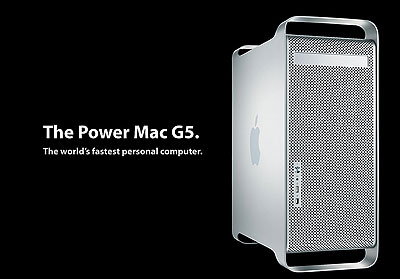Apple - the PowerMac G5, the fastest personal computer in the world
The performances of Steve Jobs at product announcements are legendary. The charisma and confidence of the man has made his keynote speeches, such as at MacWorld or WWDC, legendary. The confidence extends to products too - the iPod has been described by Apple as as revolution, whilst Jobs is often known to repeat the Wall Street Journal's hyperbolic pronouncement that the new iMac is the "gold standard" in personal computing.However, it's also known for playing fast and loose with the truth.
In June 2003, Apple unveiled the PowerMac G5 - the new version of its professional tower PC. Sporting two PowerPC chips at 2GHz, with a 1GHz FSB, Apple proclaimed it the 'World's Fastest Personal Computer'. It went on to make even more claims - that it featured the 'world's first 64-bit desktop processor', for one. How did it justify these claims?

It also intimated that the other 64-bit processor available, the Athlon 64, was primarily a workstation and profession chip, rather than a personal computer chip.
Months after the launch, following complaints from both normal people and rivals including Dell, Apple was forced to make a spectacular climbdown.

- "It understood from the advice that the advertisers' tests showed the Power Mac G5 was faster than the other two processors on some applications under certain conditions, but not that it was the fastest processor in all circumstances for all applications."
In other words, just because the G5 beat the Xeon in SPEC CPU, that didn't make it the fastest PC in the world. Especially when, as was later revealed, the SPEC benchmark was running on optimised code on the G5 but not optimised code on the Intel.
In the US, the Council of Better Business Bureaus (National Advertising Divison) said that it had
- "Determined that the evidence provided by Apple did not provide a reasonable basis for its broad unqualified claims that its Power Mac G5 is 'the world's fastest, most powerful personal computer.'"
Apple was forced to withdraw the claim in the UK, and said that it would "Be be mindful of NAD's views in its future advertising."
In the UK, the ASA said that it could believe that the 64-bit claim differentiated between workstations (Athlons) and desktops (Macs) - probably wrongly, given the massive adoption of Athlon 64 by enthusiasts. However, in the States, the NAB criticised Apple for that too, saying that it simply didn't buy the argument.
Apple has been more careful about its claims in recent years, avoiding the kind of categorical and sweeping statements that got it into trouble. The new Mac Pro, which features Intel Woodcrest chips, has been touted as the 'Fastest Mac ever'. That sounds about right.

MSI MPG Velox 100R Chassis Review
October 14 2021 | 15:04








Want to comment? Please log in.